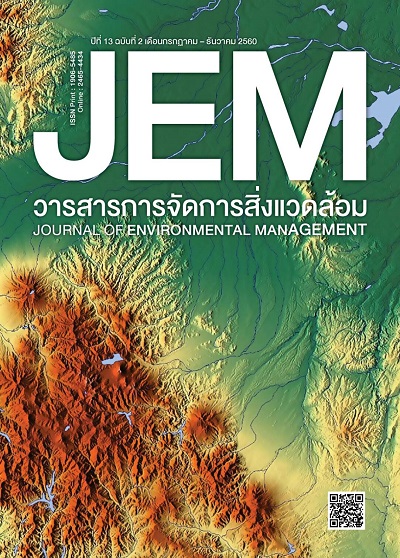การจัดการศพตามวิถีอิสลามกับการจัดการสิ่งแวดล้อมอย่างยั่งยืน ISLAMIC FUNERAL MANAGEMENT AND SUSTAINABLE ENVIRONMENTAL MANAGEMENT
บทคัดย่อ
มิติสังคมและวัฒนธรรม เป็นมิติหนึ่งของสิ่งแวดล้อมที่เกี่ยวข้องกับกิจกรรมต่างๆ ในชีวิตของมนุษย์ การทำความเข้าใจกับวัฒนธรรมจึงเป็นสิ่งสำคัญ เพราะวัฒนธรรมของมนุษย์เป็นตัวขับเคลื่อนการใช้ทรัพยากร หากการใช้ทรัพยากรนั้นไม่เหมาะสมอาจทำให้ทรัพยากรธรรมชาติและสิ่งแวดล้อมถูกทำลายได้ ตามแนวคิดการจัดการสิ่งแวดล้อม การใช้ทรัพยากรต้องวางอยู่บนพื้นฐานการใช้อย่างสมเหตุสมผลและมีการจัดการอย่างเหมาะสม ถูกวิธีและเป็นระบบ เพื่อให้ทรัพยากรธรรมชาติและสิ่งแวดล้อมเอื้ออำนวยประโยชน์ต่อมนุษย์ให้มีใช้ในอนาคตและเกิดความยั่งยืน มนุษย์เป็นส่วนหนึ่งของสิ่งแวดล้อม เมื่อมนุษย์เสียชีวิตลง การจัดการศพซึ่งเป็นของเสียต้องมีแนวทางปฏิบัติที่ไม่ก่อให้เกิดผลกระทบต่อคุณภาพสิ่งแวดล้อม ศาสนาอิสลามเป็นศาสนาที่ให้แนวทางการดำเนินชีวิตเป็นโครงสร้างทางสังคมที่มีรากฐานมาจากความศรัทธานำไปสู่การปฏิบัติและมีอิทธิพลต่อวิถีชีวิตความเป็นอยู่ของมนุษย์ในทุกด้าน รูปแบบและวิธีการจัดการศพของมุสลิมนั้นมีคำอธิบายที่เชื่อมโยงกับหลักคำสอนของศาสนา บทความนี้เป็นการนำเสนอและวิเคราะห์รูปแบบการจัดการศพตามวิถีอิสลามกับการจัดการสิ่งแวดล้อมโดยพบว่ารูปแบบจัดการศพตามวิถีอิสลามมีความเรียบง่าย ไม่ก่อให้เกิดปัญหามลพิษสิ่งแวดล้อม และมีนัยแห่งสารัตถะชีวิตในหลายมิติทั้ง ด้านสังคม เศรษฐกิจ สาธารณสุข สิ่งแวดล้อม ระบบนิเวศ และเอื้อต่อการจัดการสิ่งแวดล้อมอย่างยั่งยืน
The social and cultural dimension is one of the environmental dimensions relating to human activities. Understanding culture is important because human culture is a driver of resource use. Inappropriate resource use can lead to destruction of natural resources and environment. According to the concept of environmental management, the use of resources must be based on reasonable use and appropriate, proper, and systematic management in order to provide environmental benefits to humans for future use and sustainability. Mankind is a part of the environment. When people die, the body as waste must be disposed by methods that do not affect environmental quality. Islam is a religion that gives life guidance as a social structure which puts faith into practice and it influences human life in all aspects. The Muslim form of managing corpses has explanations that are linked to religious doctrine. This article presents and analyzes the forms of Islamic funeral practices and environmental management. It finds that Islamic funeral management is simple, and does not cause environmental pollution. Moreover, as it touches on several dimensions of life, i.e. society, economics, public health, the environment, and the ecosystem, it supports sustainable environmental management.
เอกสารอ้างอิง
Abdul Rahman Al Yabaroyn, A. (2005). Dead bodies and ritual procedures (Wongsan, M., Trans.) [In Thai]. Bangkok: World Assembly of Muslim Youth, Thailand.
Abdul Rahman Al Yabaroyn, A.(2012). Funeral rites in Islam [SalatulJanazah] (JehSeni, D., Trans.). [In Thai]. Retrieved April 28, 2016, from https://islamhouse.com/th/articles/393785/
Arab Universities Alumni Association, Thailand. (1997). Translation of the Meaning of the Noble Quran in Thai Language [In Thai]. Madina: King Fahd Glorious Quran Printing Complex.
Baianonie, M. (2000). The basic rules of Islamic funerals. Retrieved April 28, 2016, from http://islam1.org/iar/imam/archives/images/Islamic_Funerals.pdf
Ekpo, C.G. & Ishaq, A.B. (2016). Islam and the Environment: implications of Islamic Funeral Practice on Environmental sustainability. OISR Journal of Research and Method in Education (OIRS-JRME). 6(1), 58-63. Retrieved April 28, 2016, from http://www.iosrjournals.org/iosrjrme/papers/Vol-6%20Issue-1/Version-1/I06115863.pdf
Faculty of Pharmacy, Silpakorn University. (2016). Chemistry in life. Retrieved April 28, 2016, from http://oldweb.pharm.su.ac.th/chemistry-in-life/d023.html
Huda, A. (2012). Muslim environmentalists. Retrieved April 28, 2016, from http://islam.about.com/od/activism/a/Muslim-Environmentalists.htm
Institute of Geriatric Medicine, Department of Medical Services, Ministry of Public Health. (2008). Handbook: Aging Healthcare in Muslim communities for the religious leaders [In Thai]. Songkha: The Agricultural Co-operative Federation of Thailand. Retrieved April 28, 2016, from http://agingthai.dms.moph.go.th/agingthai/index.php/guidebook/172-2014-03-13-07-58-46
Jankaew, K. (2004). Environmental Science. Bangkok: Kasetsart University.
Jehni, M. (2010). Due to we are being with environment. Retrieved October 20, 2016, from http://www.deepsouthwatch.org/node/1160
Landon, M. (2006). Environment, Health and Sustainable Development. Berkshire: Tata McGraw-Hill Education.
Mahama, M. (2010). Islam and Environmental Conservation. Retrieved October 20, 2016, from http://www.e-daiyah.com/?q=ar/node/200
Masamae,M. (2011). Cremation rites in the Ganges River [In Thai]. Department of South Asia, Middle East and African Affairs. Retrieved August 25, 2016, from http://sameaf.mfa.go.th/th/country/south-asia/tips_detail.php?ID=2657
Muhammad Said, S. (2012). Islamic funeral rites [In Thai]. Retrieved April 28, 2016, from https://www.youtube.com/watch?v=G5tgGlq5tfE
Nima, Y. & Hasuwannakit, S.(Eds.). (2008). Healthcare for Muslim patients [in Thai:]. Health System Management Institute, Prince of Songkha University supported by National Health Security Office and Thai Islamic Medical Association. Retrieved April 28, 2016, from http://hsmi.psu.ac.th/upload/forum/art-hospital.pdf
Samaun, W. (Ed.). (2013). Preaching in natural resources and environment [In Thai]. Department of Environmental Quality Promotion, Ministry of Natural Resources and Environment.
Stacey, A. (2012). Funeral rites in Islam. Retrieved April 28, 2016, from https://d.islamhouse.com/data/en/ih_books/single/en_Funeral_Rites.pdf
Suzuki, P. (2005). Natural Resources and Environmental Economics [In Thai]. Nonthaburi: Sukhothai Thammathirat Open University Press. Retrieved August 25, 2016, from http://www.stou.ac.th/Schools/Sec/ejournal6-2/file/1-2-1.pdf
Taweeboon, T. (2016). ELearning: Patients with end stage [In Thai]. Retrieved April 28, 2016, from http://www.elearning.ns.mahidol.ac.th/Patients-with-end-stage/index.html
Wongchanta, P. (2011). Environmental studies. Mahasarakham: Mahasarakham University.



